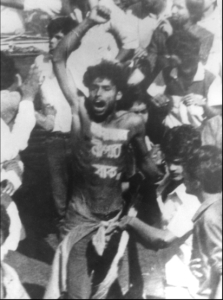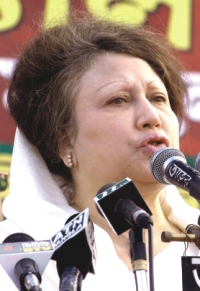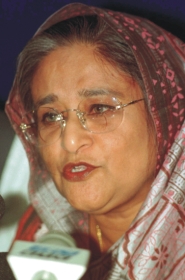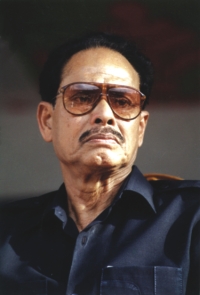| Politics
That One May Smile, and Smile, and be a Villain…
Thirty years after her husband and military dictator Ziaur Rahman rehabilitated notorious wartime collaborators, Khaleda Zia is bent on giving a new lease of life to one of the vilest dictators in the country's history
Ahmede Hussain
 General Zia, at the height of his dictatorial rule, once most infamously said that he would make politics difficult for politicians. In doing so Zia bought politicians left and right. The party that he formed immediately after seizing power in a bloody coup became a shelter for corrupt Awami Leaguers, frustrated Maoists and hibernating wartime collaborators (Razakars). Much is talked about Zia's financial honesty (Viz. his broken suitcase and ragged T-shirts) but there is no denying the fact that he believed that every politician carried a price tag and he could buy anyone if he could meet the price. General Zia, at the height of his dictatorial rule, once most infamously said that he would make politics difficult for politicians. In doing so Zia bought politicians left and right. The party that he formed immediately after seizing power in a bloody coup became a shelter for corrupt Awami Leaguers, frustrated Maoists and hibernating wartime collaborators (Razakars). Much is talked about Zia's financial honesty (Viz. his broken suitcase and ragged T-shirts) but there is no denying the fact that he believed that every politician carried a price tag and he could buy anyone if he could meet the price.
Zia was killed in one of the 30 something military revolts that his five-year rule was plagued with. Gen HM Ershad was the chief of army at that time, and the way almost all the coup plotters were killed by their fellow army-men has made many speculate about Ershad's role in the mayhem. There are other reasons to assert this claim: Months after Zia's killing Ershad assumed power by removing a frail President Abdus Sattar from power. In 1997, at a meeting in Fulbaria, Khaleda Zia, Zia's widow, accused Ershad as one of the co-conspirators behind Zia's murder. However, as a military despot, Ershad followed Zia's footsteps closely-- like his predecessor, Ershad declared a war against corruption, even bicycling his way to the office once, saying it would save money.
Zia bought politicians: Ershad used the army and government apparatus to torment them to get them by his side. Worst of all, unlike Zia, Ershad's corruption was pervasive. From mosque to rickshaw, he did not spare anything or anyone. After a Friday prayer in Kakrail Mosque he told a gathering that the previous night he had a dream that he was saying his Friday prayers in the mosque. The Imam and the fellow faithful were shocked because for the last one month, people belonging to the National Security Intelligence had been scanning the Mussalis saying the President was going to visit the place. That was a typical thing for Ershad to do-- nothing mattered to him as long as he remained the President.
Like the way Zia formed the BNP, Ershad formed his own party-- the Jatya Party (JP), which apart from corrupt Awami Leaguers and notorious Razakars, housed depraved BNP-men and a few opportunists who are now holding important portfolios in the cabinet. Ershad's violations of all the democratic institutions that Zia had not dared touch were flagrant; the country, under Ershad's rule became one of those banana republics, people of Bangladesh had only heard of and had never imagined would end up in.
 The similarity between Zia and Ershad has been striking to escape anyone's notice; the politics they both had pursued centred on different cantonments. People did not really matter, as long as you had the support of the barracks. In a plebiscite Zia got over 90 per cent of the total votes cast; Ershad, on the other hand, had more shame in him; in his own plebiscite, he gave himself over 80 per cent of the votes. The similarity between Zia and Ershad has been striking to escape anyone's notice; the politics they both had pursued centred on different cantonments. People did not really matter, as long as you had the support of the barracks. In a plebiscite Zia got over 90 per cent of the total votes cast; Ershad, on the other hand, had more shame in him; in his own plebiscite, he gave himself over 80 per cent of the votes.
It was during Ershad's corrupt reign that Khaleda Zia, earned a name for being a fearless and uncompromising leader. Khaleda refused to give legitimacy to Ershad's government by declining to participate in any elections under his regime. Sheikh Hasina, leader of Awami League, for her turn, had vowed to do the same. Half through Ershad's demonic rule, in a public meeting in Chittagong she said that only a "national traitor" would participate in any election while Ershad was in power. Two days later, Hasina changed her mind and decided to "oust Ershad through democratic process", giving Khaleda a field day.
Throughout Ershad's nine-year rule that the country had to endure, Khaleda stuck to  that stance. Hasina in the same issue suffered from indecision and lack of vision. Even after Ershad's police shot and killed Noor Hossain-- an incident that snowballed into a mass upsurge in 1987-- Hasina did not resign from the dictator's rubberstamp parliament. It took three more years and more bloodshed to oust Ershad in 1990. that stance. Hasina in the same issue suffered from indecision and lack of vision. Even after Ershad's police shot and killed Noor Hossain-- an incident that snowballed into a mass upsurge in 1987-- Hasina did not resign from the dictator's rubberstamp parliament. It took three more years and more bloodshed to oust Ershad in 1990.
Hasina's flippancy cost her dearly, in the elections that followed Ershad's ouster, Khaleda, and her party, with the help of Jamaat got a single majority in the parliament. Though her government did not send Ershad to the dock for illegally seizing power, numerous cases of corruption were brought against him, some of which are still pending. In its first term, the Khaleda government brought numerous cases of graft against Ershad, and the deposed dictator had to serve prison sentences for corruption.
Immediately before the 2001 general elections, the BNP tried to woo Ershad; the JP president, a shrewd politician that he is, had promised to join hands with the BNP, but later backed off and formed an alliance with a cluster of extreme-rightist elements of the country's political spectrum. Five years after that the "Uncompromising leader", it seems, still wants Ershad's hand. Last month, Khaleda sent her son Tarique Rahman to Ershad's house to make a bargain with the despot; this time round, Ershad has set two preconditions before the BNP to form an alliance: The 13 cases of corruption that are pending against him at the court have to be withdrawn and, more interestingly, the second one requires the BNP to declare Ershad President should the party win the elections. Tarique, also the BNP's joint secretary general, has apparently nodded in assent to this despicable person, whom only a few years ago his mother had called his father's killer.
The incident only shows the level of desperation the BNP is mired in. The party has so far had an open door for all the extremist elements of Bangladesh politics: From notorious killers and war criminals like Matiur Rahman Nizami and Delwar Hossain Saidi to bigots like Fazlul Haque Amini, the BNP-led Four Party Alliance has every type of extremist elements in it, only Ershad's name has been missing from this list of war criminals, corrupt politicians and religious extremists.
 Given the way the BNP had banked on and cashed in on Khaleda's "uncompromising image" only a few years ago, this tail-between-the legs attitude of Tarique's should have come to the voters as a ghastly surprise. But, eerily for the party, most of them, though annoyed as they are at the move, have expected the BNP to join hands with the military despot. The reason is not unfathomable. It is understandable that a group of people neck-deep in corruption and misgovernment will seek solace on the shoulder of fellow crooks. So lost in the labyrinth of power are the voters… a dictator, worse still a convicted criminal, after Tarique Rahman's magical nod could be turned into a major ally, a people's leader… Given the way the BNP had banked on and cashed in on Khaleda's "uncompromising image" only a few years ago, this tail-between-the legs attitude of Tarique's should have come to the voters as a ghastly surprise. But, eerily for the party, most of them, though annoyed as they are at the move, have expected the BNP to join hands with the military despot. The reason is not unfathomable. It is understandable that a group of people neck-deep in corruption and misgovernment will seek solace on the shoulder of fellow crooks. So lost in the labyrinth of power are the voters… a dictator, worse still a convicted criminal, after Tarique Rahman's magical nod could be turned into a major ally, a people's leader…
The BNP leadership, however unwittingly, is sending all the wrong signals to the voters-- forget about Ershad's vile past, his demonic rule; hold back the fact that his hands are caked with the blood of Maijuddin, Nur Hossain, Dr Milan and hundreds of martyrs; erase his diabolic past…just for once; we badly need to win the elections again, and for that we need to sell our soul to the Devil… Dear citizens, please…
One can picture the bemused voters staring down in contempt at the BNP's recent move. Even in the elections of 1991 or 1996 Ershad and his JP could have been considered a force in the country's politics. Since his party has been split into almost half a dozen factions, Ershad has lost that national appeal which the BNP is so belatedly thinking he has. Even the mass support he had in northeastern hinterland has been waning. This new alliance will remain a mere gimmick, perhaps it is meant to be one of those expensive and erratic stunts politicians find themselves performing at times.
The irony, however, does not escape us: What links Khaleda's BNP and Ershad's JP is a common history of misrule and corruption; and faced with the possibility of an ignominious ouster in the next elections because of unabated corruption and shameless nepotism the BNP needs Ershad's support. There are a few more standing jokes attached to this squalid saga: With memories of Ershad's razzias still fresh and vivid, this new alliance may come to many as an incident plucked up from one of those bad gangster movies where goons swear allegiances and form umbrella groups to fight the cops.
While trying to give a new lease of life to Ershad, Khaleda Zia runs the risk of being thrown into the dustbin of history. So much for the uncompromising Jononetri that she once was.
Copyright
(R) thedailystar.net 2006 |
